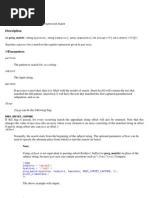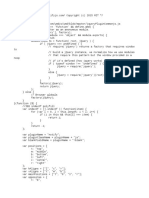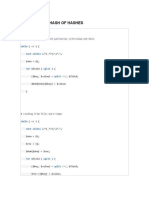The Ultimate Cheat Sheet of Equivalents in Python and Javascript
Uploaded by
GalviYanezThe Ultimate Cheat Sheet of Equivalents in Python and Javascript
Uploaded by
GalviYanezThe Ultimate List of Equivalents in Python and JavaScript by @DjangoTricks
Time-honored Python JavaScript (ECMAScript 5)
Parse integer number = int(text) number = parseInt(text, 10);
Conditional assignment value = 'ADULT' if age >= 18 else 'CHILD' value = age >= 18? 'ADULT': 'CHILD';
Object attribute value by attribute = 'color' attribute = 'color';
value = getattr(obj, attribute, 'GREEN') value = obj[attribute] || 'GREEN';
name setattr(obj, attribute, value) obj[attribute] = value;
Dictionary value by key key = 'color' key = 'color';
value = dictionary.get(key, 'GREEN') value = dictionary[key] || 'GREEN';
dictionary[key] = value dictionary[key] = value;
List slices items = [1, 2, 3, 4, 5] items = [1, 2, 3, 4, 5];
first_two = items[:2] # [1, 2] first_two = items.slice(0, 2); // [1, 2]
last_two = items[-2:] # [4, 5] last_two = items.slice(-2); // [4, 5]
middle_three = items[1:4] # [2, 3, 4] middle_three = items.slice(1, 4); // [2, 3, 4]
String slices text = 'ABCDE' text = 'ABCDE';
first_two = text[:2] # 'AB' first_two = text.slice(0, 2); // 'AB'
last_two = text[-2:] # 'DE' last_two = text.slice(-2); // 'DE'
middle_three = text[1:4] # 'BCD' middle_three = text.slice(1, 4); // 'BCD'
List operations items1 = ['A'] items1 = ['A'];
items2 = ['B'] items2 = ['B'];
items = items1 + items2 # items == ['A', 'B'] items = items1.concat(items2); // items === ['A', 'B']
items.append('C') # ['A', 'B', 'C'] items.push('C'); // ['A', 'B', 'C']
items.insert(0, 'D') # ['D', 'A', 'B', 'C'] items.unshift('D'); // ['D', 'A', 'B', 'C']
first = items.pop(0) # ['A', 'B', 'C'] first = items.shift(); // ['A', 'B', 'C']
last = items.pop() # ['A', 'B'] last = items.pop(); // ['A', 'B']
items.delete(0) # ['B'] items.splice(0, 1); // ['B']
Joining lists of strings items = ['A', 'B', 'C'] items = ['A', 'B', 'C'];
text = ', '.join(items) # 'A, B, C' text = items.join(', '); // 'A, B, C'
JSON import json
json_data = json.dumps(dictionary, indent=4) json_data = JSON.stringify(dictionary, null, 4);
dictionary = json.loads(json_data) dictionary = JSON.parse(json_data);
Splitting strings by regular import re
# One or more of "!?." followed by whitespace // One or more of "!?." followed by whitespace
expressions delimiter = re.compile(r'[!?\.]+\s*') delimiter = /[!?\.]+\s*/;
text = "Hello!!! What's new? Follow me." text = "Hello!!! What's new? Follow me.";
sentences = delimiter.split(text) sentences = text.split(delimiter);
# sentences == ['Hello', "What's new", 'Follow me', // sentences == ["Hello", "What's new", "Follow me", ""]
'']
Matching regular import re
# name, "@", and domain // name, "@", and domain
expression patterns in pattern = re.compile( pattern = /([\w.+\-]+)@([\w\-]+\.[\w\-.]+)/;
strings r'([\w.+\-]+)@([\w\-]+\.[\w\-.]+)'
)
match = pattern.match('hi@example.com') match = 'hi@example.com'.match(pattern);
# match.group(0) == 'hi@example.com' // match[0] === 'hi@example.com'
# match.group(1) == 'hi' // match[1] === 'hi'
# match.group(2) == 'example.com' // match[2] === 'example.com'
text = 'Say hi at hi@example.com' text = 'Say hi at hi@example.com';
first_match = pattern.search(text) first_match = text.search(pattern);
if first_match: if (first_match > -1) {
start = first_match.start() # start == 10 start = first_match; // start === 10
}
Replacing patterns in import re
# name, "@", and domain // name, "@", and domain
strings using regular pattern = re.compile( pattern = /([\w.+\-]+)@([\w\-]+\.[\w\-.]+)/;
expressions r'([\w.+\-]+)@([\w\-]+\.[\w\-.]+)'
) html = 'Say hi at hi@example.com'.replace(
pattern,
html = pattern.sub( '<a href="mailto:$&">$&</a>',
r'<a href="mailto:\g<0>">\g<0></a>', );
'Say hi at hi@example.com', // html === 'Say hi at <a
) href="mailto:hi@example.com">hi@example.com</a>'
# html == 'Say hi at <a
href="mailto:hi@example.com">hi@example.com</a>' text = 'Say hi at hi@example.com'.replace(
pattern,
text = pattern.sub( function(match, p1, p2) {
lambda match: match.group(0).upper(), return match.toUpperCase();
'Say hi at hi@example.com', }
) );
# text == 'Say hi at HI@EXAMPLE.COM' // text === 'Say hi at HI@EXAMPLE.COM'
Error handling class MyException(Exception): function MyException(message) {
def __init__(self, message): this.message = message;
self.message = message this.toString = function() {
return this.message;
def __str__(self): }
return self.message }
def proceed(): function proceed() {
raise MyException('Error happened!') throw new MyException('Error happened!');
}
try: try {
proceed() proceed();
except MyException as err: } catch (err) {
print('Sorry! {}'.format(err)) if (err instanceof MyException) {
finally: console.log('Sorry! ' + err);
print('Finishing') }
} finally {
console.log('Finishing');
}
Revision 12 March 2019 More details: http://bit.ly/2tXLoXq
The Ultimate List of Equivalents in Python and JavaScript by @DjangoTricks
Future-proof Python JavaScript (ECMAScript 6)
Variables in strings name = 'World' name = 'World';
value = f"""Hello, {name}! value = `Hello, ${name}!
Welcome!""" # Python 3.6 Welcome!`;
price = 14.9 price = 14.9;
value = f'Price: {price:.2f} €' # 'Price: 14.90 €' value = `Price ${price.toFixed(2)} €`; // 'Price: 14.90 €'
Unpacking lists a = 1 a = 1;
b = 2 b = 2;
a, b = b, a # swap values [a, b] = [b, a]; // swap values
first, second, *the_rest = [1, 2, 3, 4] # Python 3.6 [first, second, ...the_rest] = [1, 2, 3, 4];
# first == 1, second == 2, the_rest == [3, 4] // first === 1, second === 2, the_rest === [3, 4]
Lambda functions sum = lambda x, y: x + y sum = (x, y) => x + y;
square = lambda x: x ** 2 square = x => Math.pow(x, 2);
Iteration for item in ['A', 'B', 'C']: for (let item of ['A', 'B', 'C']) {
print(item) console.log(item);
}
Generators def countdown(counter): function* countdown(counter) {
while counter > 0: while (counter > 0) {
yield counter yield counter;
counter -= 1 counter--;
}
}
for counter in countdown(10): for (let counter of countdown(10)) {
print(counter) console.log(counter);
}
Sets s = set(['A']) s = new Set(['A']);
s.add('B'); s.add('C') s.add('B').add('C');
'A' in s s.has('A') === true;
len(s) == 3 s.size === 3;
for elem in s: for (let elem of s.values()) {
print(elem) console.log(elem);
}
s.remove('C') s.delete('C');
Function arguments from pprint import pprint
function create_post(options) {
def create_post(**options): console.log(options);
pprint(options) }
function report(post_id, reason='not-relevant') {
def report(post_id, reason='not-relevant'): console.log({post_id: post_id, reason: reason});
pprint({'post_id': post_id, 'reason': reason}) }
def add_tags(post_id, *tags): function add_tags(post_id, ...tags) {
pprint({'post_id': post_id, 'tags': tags}) console.log({post_id: post_id, tags: tags});
}
create_post(title='Hello, World!', content='')
report(42) create_post({title: 'Hello, World!', content': ''});
report(post_id=24, reason='spam') report(42);
add_tags(42, 'python', 'javascript', 'django') report(post_id=24, reason='spam');
add_tags(42, 'python', 'javascript', 'django');
Classes and inheritance class Post(object): class Post {
def __init__(self, id, title): constructor (id, title) {
self.id = id this.id = id;
self.title = title this.title = title;
}
def __str__(self): toString() {
return self.title return this.title;
}
}
class Article(Post):
def __init__(self, id, title, content): class Article extends Post {
super(Article, self).__init__(id, title) constructor (id, title, content) {
self.content = content super(id, title);
this.content = content;
}
class Link(Post): }
def __init__(self, id, title, url):
super(Link, self).__init__(id, title) class Link extends Post {
self.url = url constructor (id, title, url) {
super(id, title);
def __str__(self): this.url = url;
return '{} ({})'.format( }
super(Link, self).__str__(), toString() {
self.url, return super.toString() + ' (' + this.url + ')';
) }
}
article = Article(1, 'Hello, World!', article = new Article(1, 'Hello, World!',
'This is my first article.' 'This is my first article.'
) );
link = Link(2, 'The Example', 'http://example.com') link = new Link(2, 'The Example', 'http://example.com');
# isinstance(article, Post) == True // article instanceof Post === true
# isinstance(link, Post) == True // link instanceof Post === true
print(link) console.log(link.toString());
# The Example (http://example.com) // The Example (http://example.com)
Class properties: getters class Post(object): class Post {
def __init__(self, id, title): constructor (id, title) {
and setters self.id = id this.id = id;
self.title = title this.title = title;
self._slug = '' this._slug = '';
}
@property
def slug(self): set slug(value) {
return self._slug this._slug = value;
}
@slug.setter
def slug(self, value): get slug() {
self._slug = value return this._slug;
}
}
post = Post(1, 'Hello, World!') post = new Post(1, 'Hello, World!');
post.slug = 'hello-world' post.slug = 'hello-world';
print(post.slug) console.log(post.slug);
Revision 12 March 2019 More details: http://bit.ly/2tXLoXq
The Ultimate List of Equivalents in Python and JavaScript by @DjangoTricks
Bonus Python JavaScript (ECMAScript 6)
All truthful elements items = [1, 2, 3] items = [1, 2, 3];
all_truthy = all(items) all_truthy = items.every(Boolean);
# True // true
Any truthful elements items = [0, 1, 2, 3] items = [0, 1, 2, 3];
some_truthy = any(items) some_truthy = items.some(Boolean);
# True // true
Iterate through each items = ['a', 'b', 'c', 'd'] items = ['a', 'b', 'c', 'd'];
element and its index for index, element in enumerate(items): items.forEach(function(element, index) {
print(f'{index}: {element};') console.log(`${index}: ${element};`);
});
Map elements to the items = [0, 1, 2, 3] items = [0, 1, 2, 3];
results of a function all_doubled = list( all_doubled = items.map(
map(lambda x: 2 * x, items) x => 2 * x
) );
# [0, 2, 4, 6] // [0, 2, 4, 6]
Filter elements by a items = [0, 1, 2, 3] items = [0, 1, 2, 3];
function only_even = list( only_even = items.filter(
filter(lambda x: x % 2 == 0, items) x => x % 2 === 0
) );
# [0, 2] // [0, 2]
Reduce elements by a from functools import reduce
function to a single value items = [1, 2, 3, 4] items = [1, 2, 3, 4];
total = reduce( total = items.reduce(
lambda total, current: total + current, (total, current) => total + current
items, );
) // 10
# 10
Merge dictionaries d1 = {'a': 'A', 'b': 'B'} d1 = {a: 'A', b: 'B'}
d2 = {'a': 'AAA', 'c': 'CCC'} d2 = {a: 'AAA', c: 'CCC'}
merged = {**d1, **d2} # since Python 3.5 merged = {...d1, ...d2};
# {'a': 'AAA', 'b': 'B', 'c': 'CCC'} // {a: 'AAA', b: 'B', c: 'CCC'}
Revision 12 March 2019 More details: http://bit.ly/2tXLoXq
You might also like
- Innovations in Portland Cement Manufacturing80% (5)Innovations in Portland Cement Manufacturing1,283 pages
- Dictionary: Dict ('Name': 'Geeks', 1: (1, 2, 3, 4) )No ratings yetDictionary: Dict ('Name': 'Geeks', 1: (1, 2, 3, 4) )14 pages
- 238 Mini-API / Cheat Sheet You May Detach These Sheets SelectingNo ratings yet238 Mini-API / Cheat Sheet You May Detach These Sheets Selecting4 pages
- Searching With PHP and Mysql: by Cal HendersonNo ratings yetSearching With PHP and Mysql: by Cal Henderson8 pages
- Dictionary, Its Built-In Functions and MethodsNo ratings yetDictionary, Its Built-In Functions and Methods24 pages
- Dictionaries: # Syntax # Dictionary With Data ValuesNo ratings yetDictionaries: # Syntax # Dictionary With Data Values7 pages
- Delhi University PHP Question Paper Solution0% (2)Delhi University PHP Question Paper Solution9 pages
- Generation of A HASH OF HASHES: # Reading From FileNo ratings yetGeneration of A HASH OF HASHES: # Reading From File11 pages
- 19BBTCS069 KrishnaKantPandey DAP Lab RecordNo ratings yet19BBTCS069 KrishnaKantPandey DAP Lab Record100 pages
- Compute The Greatest Common Divisor and Least Common Multiple of Two IntegersNo ratings yetCompute The Greatest Common Divisor and Least Common Multiple of Two Integers26 pages
- Tomorrow I LL Learn PHP Global Variables. This Is A Bad Command: Del C: .No ratings yetTomorrow I LL Learn PHP Global Variables. This Is A Bad Command: Del C: .5 pages
- Coding Interview Python Language EssentialsNo ratings yetCoding Interview Python Language Essentials5 pages
- Django-Bootstrap-Breadcrumbs Documentation: Release 0.6.3No ratings yetDjango-Bootstrap-Breadcrumbs Documentation: Release 0.6.321 pages
- QUERO CONHECER JESUS (VIDEOAULA) Fingerstyle COMPLETA PDFNo ratings yetQUERO CONHECER JESUS (VIDEOAULA) Fingerstyle COMPLETA PDF6 pages
- Hallelujah (VIDEOAULA+TAB) Fingerstyle by Rafael Alves PDFNo ratings yetHallelujah (VIDEOAULA+TAB) Fingerstyle by Rafael Alves PDF2 pages
- Ousado Amor (AULA de VIOLÃO) Fingerstyle (Isaias Saad) Como Tocar (Passo A Passo) Com TablaturaNo ratings yetOusado Amor (AULA de VIOLÃO) Fingerstyle (Isaias Saad) Como Tocar (Passo A Passo) Com Tablatura8 pages
- Openerp User Training v6 Script 3.0 PDFNo ratings yetOpenerp User Training v6 Script 3.0 PDF51 pages
- Datasheet 60 KW Diesel Generator 75 Kva 3 Phase Sdmo John Deere J60u100% (1)Datasheet 60 KW Diesel Generator 75 Kva 3 Phase Sdmo John Deere J60u5 pages
- Literary Genre On Creative Multimedia PresentationNo ratings yetLiterary Genre On Creative Multimedia Presentation21 pages
- Every Letter I Write Is Not A Love Letter': Ina BlomNo ratings yetEvery Letter I Write Is Not A Love Letter': Ina Blom10 pages
- The Fundamental Acts Relating To Telecommunications and Broadcasting Services (Unofficial Translation)No ratings yetThe Fundamental Acts Relating To Telecommunications and Broadcasting Services (Unofficial Translation)304 pages
- Project Camelot Aaron McCollum TranscriptNo ratings yetProject Camelot Aaron McCollum Transcript31 pages
- [FREE PDF sample] Parsforte Internazionale de arte 3rd Edition Parsforte International Amiramin Sharifi ebooks100% (3)[FREE PDF sample] Parsforte Internazionale de arte 3rd Edition Parsforte International Amiramin Sharifi ebooks50 pages
- Topic 1 Accounting Changes and Correction of ErrorsNo ratings yetTopic 1 Accounting Changes and Correction of Errors2 pages
- Schein (2010:6), Organizational Culture Can Be Defined As "A Pattern of Shared BasicNo ratings yetSchein (2010:6), Organizational Culture Can Be Defined As "A Pattern of Shared Basic5 pages
- Soc105 - r5 - Consumption and Mass Media Worksheet100% (1)Soc105 - r5 - Consumption and Mass Media Worksheet3 pages
- Indicators, Sight, Liquid Level, Direct and Indirect Reading, Tubular Glass/PlasticNo ratings yetIndicators, Sight, Liquid Level, Direct and Indirect Reading, Tubular Glass/Plastic8 pages
- LBHM 3Rd All India Open Fide Rated Chess Tournament-2019 Click On Invitation For Prize ListNo ratings yetLBHM 3Rd All India Open Fide Rated Chess Tournament-2019 Click On Invitation For Prize List10 pages


































































































